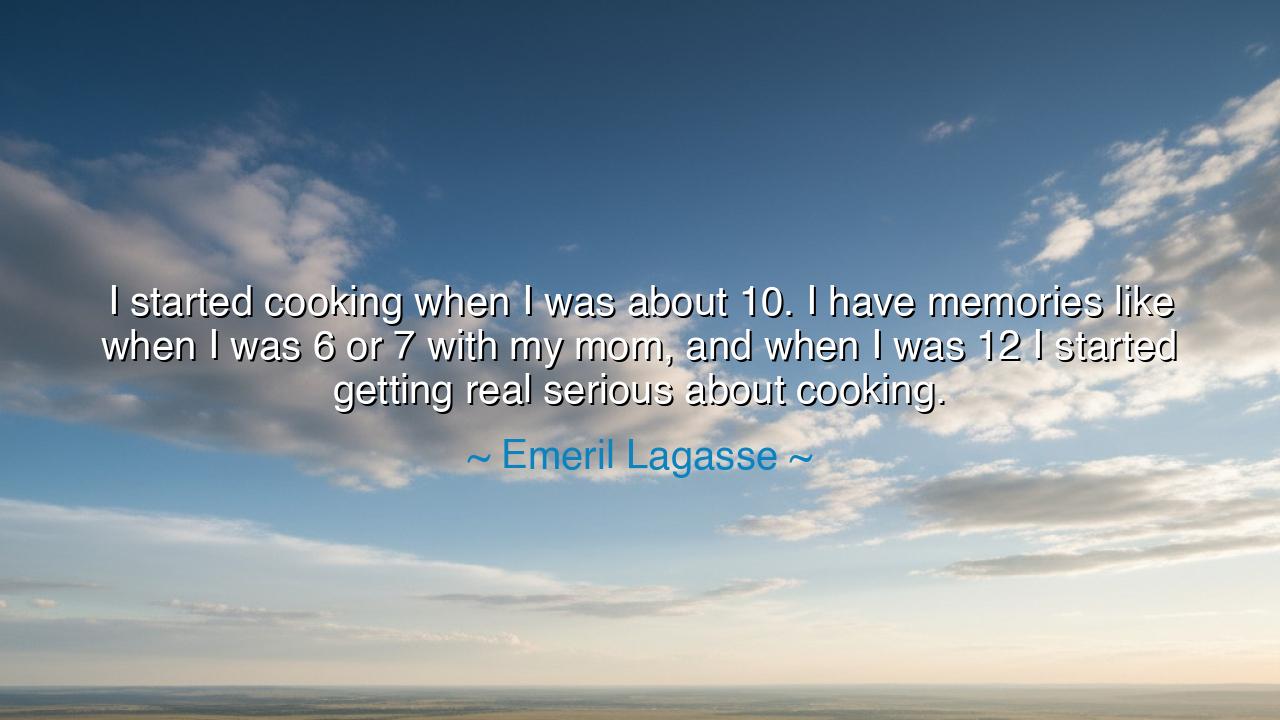
I started cooking when I was about 10. I have memories like when
I started cooking when I was about 10. I have memories like when I was 6 or 7 with my mom, and when I was 12 I started getting real serious about cooking.






When Emeril Lagasse said, “I started cooking when I was about 10. I have memories like when I was 6 or 7 with my mom, and when I was 12 I started getting real serious about cooking,” he was not simply recalling the early steps of a career—he was recounting the awakening of a calling. His words reveal the sacred journey of one who finds his purpose in the simplicity of everyday life, where art begins not with fame or ambition, but with love, memory, and devotion. Behind this humble recollection lies a truth as old as the first hearth fire: the path to mastery begins in childhood wonder and deep affection for the craft.
To cook at ten, to remember the warmth of the kitchen at six, is to be touched by the invisible inheritance passed from parent to child. The mother in his story is not merely a figure of nurture—she is the first teacher, the quiet priestess of the sacred flame. Through her hands, the child learns more than recipes; he learns patience, rhythm, and the communion between body and spirit that every act of creation demands. The kitchen, for young Emeril, became both workshop and temple, where he would one day forge his destiny. And when he says he became “serious” at twelve, we hear the sound of awakening—the moment when play becomes purpose.
In ancient times, such devotion from youth was honored as a sign of divine favor. Leonardo da Vinci began sketching machines before he was ten; Mozart wrote his first compositions as a child; Michelangelo sculpted as though guided by heaven itself before he became a man. The ancients would have called such souls “touched by the muse.” For what they do is not learned by force—it flows naturally, as a river finds its way to the sea. Emeril Lagasse’s early years of stirring, tasting, and learning beside his mother were not random—they were the shaping of a destiny that would one day ignite kitchens across the world.
Yet beneath his quote lies something even deeper: a reverence for beginnings. In a world that often glorifies results, he reminds us that greatness begins in the smallest of acts—the chopping of herbs, the scent of onions in butter, the watching and imitating of those we love. The seed of passion is sown not in applause, but in the quiet repetition of care. That is how a boy at ten becomes a master in adulthood—through consistency, humility, and an open heart. His early seriousness was not arrogance, but respect for the craft, a recognition that beauty demands discipline.
There is also a subtle beauty in how his memories are framed: the way he moves from play to purpose mirrors the human journey itself. We all begin by imitating those before us, fumbling in curiosity, until one day our hands remember what our hearts already know. That is the essence of apprenticeship, whether in art, philosophy, or life. The ancient guilds understood this truth—no one begins as a master. One must first learn through service, repetition, and devotion. The kitchen, like life, rewards those who stay long enough to listen.
The meaning of his quote, then, stretches beyond the culinary. It is about the slow cultivation of skill and soul. It teaches that mastery does not descend suddenly—it grows quietly, year after year, watered by memory and effort. The boy who once cooked beside his mother carries her lessons forever in his hands, turning simple ingredients into nourishment and joy. Thus, his story is not merely his own—it is the story of every artist, every craftsman, every dreamer who once looked at something ordinary and saw within it the spark of destiny.
Let the listener, then, take this lesson to heart: Begin early. Begin humbly. Begin with love. Whatever your calling, nurture it as a gardener tends his soil. Do not seek greatness at once; seek understanding. Let repetition become meditation, and let memory guide your hand. For as Emeril Lagasse discovered in the warmth of his mother’s kitchen, the fire of mastery begins not in ambition, but in affection—and the one who starts with love will, in time, create works that feed both the body and the soul.






AAdministratorAdministrator
Welcome, honored guests. Please leave a comment, we will respond soon